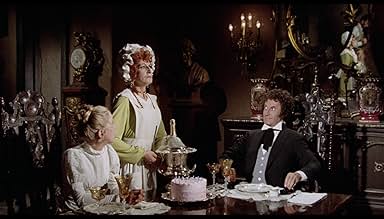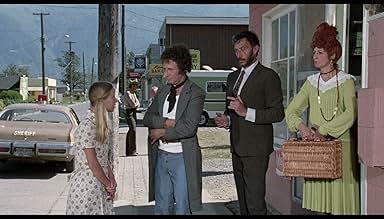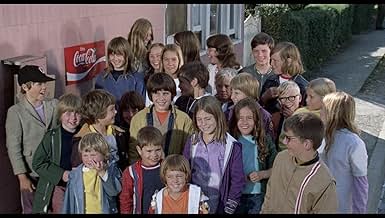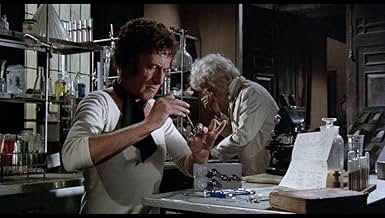A mute puppeteer uses a deceased scientist's invention to control dead bodies like puppets.A mute puppeteer uses a deceased scientist's invention to control dead bodies like puppets.A mute puppeteer uses a deceased scientist's invention to control dead bodies like puppets.
- Nominated for 1 Oscar
- 1 nomination total
- Director
- Writer
- All cast & crew
- Production, box office & more at IMDbPro
Featured reviews
I am sure the cult followers of this film will not like my review, but that's partly what makes this film a cult classic--either you like it or you don't. Even with nothing else to do on a late Friday night, and a stiff drink, a bag of chips, and the need to escape from the cares of the week, I found myself flipping to other channels during the painfully slow segments of this film. The (un)editing and overall incredibly slow flow of this story made it a struggle to stay tuned in. If properly edited, it could have easily been a half-hour "Tales from the Dark Side." In fact, the quality of the shots and lighting made me convinced that it was a made-for-TV film.
All that said, it's interesting to see the movie once, as if it was assigned in a "70s film appreciation" class. But be prepared with something else to do--like sorting receipts for taxes, or playing solitaire.
You may find yourself yelling at the screen--"How many times does the editor have to cut back to his face? We've got the point! Now move on with the action!!!" and, "could he walk down that hallway any slower???" My favorite part of the movie was watching the great body movement of the actors who played the re-animated zombies. And it's funny that Marcel was NOT the best one of these!
All that said, it's interesting to see the movie once, as if it was assigned in a "70s film appreciation" class. But be prepared with something else to do--like sorting receipts for taxes, or playing solitaire.
You may find yourself yelling at the screen--"How many times does the editor have to cut back to his face? We've got the point! Now move on with the action!!!" and, "could he walk down that hallway any slower???" My favorite part of the movie was watching the great body movement of the actors who played the re-animated zombies. And it's funny that Marcel was NOT the best one of these!
And that's not an exaggeration. I searched for this movie for a long time, and I'm glad I found it. Marcel Marceau plays Shanks, a deaf puppet maker, and Walker, an old scientist who has discovered the secret of reanimating the dead. He plays both beautifully, using his pantomime skills to achieve silent movie style acting. In fact, that's what this movie reminds me of - a silent fairy tale (the use of title cards to introduce scenes further suggests this), with a little George Romero thrown in! It's incredible that something this abstract and individualistic was made; I wish more movies would be as bold. The opening credits sequence, with tinted photos of kids watching Shanks' puppet show while the weird Oscar nominated (!) music plays is incredibly strange, memorable, and disturbing.
William Castle, of all people, directed. This movie shows, more than any other, that he was more than just the "King of Gimmicks". To see such an expressionistic and disturbing vision.......is to regret that this was his final film as director.
William Castle, of all people, directed. This movie shows, more than any other, that he was more than just the "King of Gimmicks". To see such an expressionistic and disturbing vision.......is to regret that this was his final film as director.
This must surely be one of the most neglected fantasy films of all time. By all accounts a flop at the time of it's release, it has become the hardest to see of all William Castle's movies. It's also in colour, which is another rarity from this director. French mime/actor Marcel Marceau plays the title role of Malcolm Shanks, a deaf mute puppeteer who scratches out a living putting on shows for children, while bearing the brunt of a miserable home life with his money grabbing brother and sister-in-law, who take all the money he earns for themselves. One day, an elderly professor (also played by Marceau in a dual role) sees his puppet show and offers Shanks a job - to come to his home to assist him is some experiments involving the artificial stimulation of dead animals via electricity, or something...why or how it actually works is not expanded on, but it involves small implants being attached to the muscles and these are then activated by means of a small control box.
Due to his background with puppets, Shanks proves to be very adept at controlling the movement of his first animals (a dead frog, and later a rooster). However things take an unexpected turn when he turns up for work one day only to find the professor dead in his armchair, seemingly from natural causes. Shanks has all but been hounded out of his own home by his cruel relatives, and he realises that desperate measures are needed to avoid going back there...and so the professor becomes the first human subject for re-animation.
What follows is the beginning of a macabre and dreamlike fantasy. The "awakening" of the dead professor is one of the most ghoulish things I have ever seen. Marceau is famous as a physical performer, and his depiction of a dead body being artificially roused into movement is very skillful. With a shock of white hair, sunken face and glazed white eyeballs, the professor's body jerks up off the ground and begins to wobble around the laboratory, as Shanks perfects his manipulation of the control box. It isn't long before he feels confident enough to take his new puppet on a stroll into the streets outside, and this is the start of an escalation of events that you really need to watch to get the full enjoyment out of.
This is almost a silent movie for much of it's running time, with long scenes involving no dialogue whatsoever, but the film is so effective in holding your attention that you will barely even notice the fact that nobody is talking. Shanks himself never speaks at all, but the support character all talk naturally when required - except for when they are dead of course! And some rather charming silent movie-style subtitle boards on the screen fill in any required exposition. The acting in this film is amazing, I suspect that Marceau is not the only performer to have a background in mime or theatre, as when he has to animate other dead characters, the movements are always effectively creepy.
If I have any criticism, it would be that Castle - as he has often done before - stays shy of making the film as truly horrific as it could have been. He never exploits the "yuk" factor of the dead bodies, and there is no allusion to bloodshed or decomposition at any time. William Castle is an oddity among horror directors in that he always puts on the brakes before his subject matter goes to deep into unpleasant territory, whereas others would gleefully revel in the more gruesome aspects of a story like this, Castle seems to prefer to keep things suitable for family viewing! Plus, the movie even ends with a tacked on "it's only make-believe" epilogue that completely squashes the very dark ending of the real story...it's something he has done before, and it seems a shame that the films of William Castle are often sabotaged from being truly horror by the directors very own sensibilities.
That notwithstanding, I would call "Shanks" a success, as it holds your attention constantly throughout. If any one thinks Marcel Marceau's talents end with a white made-up face and leotard, they should see him in this...he is perfect for the part, effective in bringing his whole character to life without speaking a single word. The film is a true oddity, but almost impossible to classify. Ultimately, it's just a unique and bewildering experience, and I think everyone should see it.
Due to his background with puppets, Shanks proves to be very adept at controlling the movement of his first animals (a dead frog, and later a rooster). However things take an unexpected turn when he turns up for work one day only to find the professor dead in his armchair, seemingly from natural causes. Shanks has all but been hounded out of his own home by his cruel relatives, and he realises that desperate measures are needed to avoid going back there...and so the professor becomes the first human subject for re-animation.
What follows is the beginning of a macabre and dreamlike fantasy. The "awakening" of the dead professor is one of the most ghoulish things I have ever seen. Marceau is famous as a physical performer, and his depiction of a dead body being artificially roused into movement is very skillful. With a shock of white hair, sunken face and glazed white eyeballs, the professor's body jerks up off the ground and begins to wobble around the laboratory, as Shanks perfects his manipulation of the control box. It isn't long before he feels confident enough to take his new puppet on a stroll into the streets outside, and this is the start of an escalation of events that you really need to watch to get the full enjoyment out of.
This is almost a silent movie for much of it's running time, with long scenes involving no dialogue whatsoever, but the film is so effective in holding your attention that you will barely even notice the fact that nobody is talking. Shanks himself never speaks at all, but the support character all talk naturally when required - except for when they are dead of course! And some rather charming silent movie-style subtitle boards on the screen fill in any required exposition. The acting in this film is amazing, I suspect that Marceau is not the only performer to have a background in mime or theatre, as when he has to animate other dead characters, the movements are always effectively creepy.
If I have any criticism, it would be that Castle - as he has often done before - stays shy of making the film as truly horrific as it could have been. He never exploits the "yuk" factor of the dead bodies, and there is no allusion to bloodshed or decomposition at any time. William Castle is an oddity among horror directors in that he always puts on the brakes before his subject matter goes to deep into unpleasant territory, whereas others would gleefully revel in the more gruesome aspects of a story like this, Castle seems to prefer to keep things suitable for family viewing! Plus, the movie even ends with a tacked on "it's only make-believe" epilogue that completely squashes the very dark ending of the real story...it's something he has done before, and it seems a shame that the films of William Castle are often sabotaged from being truly horror by the directors very own sensibilities.
That notwithstanding, I would call "Shanks" a success, as it holds your attention constantly throughout. If any one thinks Marcel Marceau's talents end with a white made-up face and leotard, they should see him in this...he is perfect for the part, effective in bringing his whole character to life without speaking a single word. The film is a true oddity, but almost impossible to classify. Ultimately, it's just a unique and bewildering experience, and I think everyone should see it.
Maybe some of the all american readers of IMDb will be insulted by my establishing a certain degree of comparision between this gem of a horror movie and Jackie Gleason's emotionally charged melodrama 'Gigot'. Well, if so, I ask for your pardon in advance, and state that, on no account, is my intention to offend you in any ways.
Nevertheless, the way I envision, this brilliant movie, 'Shanks' is a clever - if unintentional - satire of what would Gleason's Gigot do if he was an actual human being - after all, a man that wonderfully good could not be from this foul Earth of ours.
Marcel Marceau is a deaf mute aspiring to be a puppeteer whose existence is torn to shreds by his shrewish sister and drunken brother in law. Here, the shades of Gigot appear, since Jackie Gleason's character is constantly taunted - not by family, but by acquaintances who share the same street and later on, a woman, with whom he desperately falls in love.
Marceu is invited to work with a dying scientist working on a project to reanimate the dead. When he dies, Marceau uses the techniques trusted to him by his mentor to re-animate him as well. He has a lot of fun improving his work, and controlling his every move through a small remote control. That way he actually becomes more of a puppeteer than ever - only now, his manipulating powers are aimed towards the dead.
His vengeance towards his sister and brother in law are rather obvious, but frightening, nevertheless. He murders them - and deprives them from the little decency that exists in 'dying', by manipulating them, just like they manipulated him, when living. He leads the dead bodies around with morbid pleasure, and degrades them as much as he can, therefore, satisfying his justifiable yearnings. Yet, things begin the go sour after his protegee - a young adolescent whose character bears much of the little girl in 'Gigot' - discovers that those people that are constantly walking down the streets if the small town they live in, are, in fact, dead.
The movie's punch is lost in the ending, when the evil outside Marceau's world of vengeance - represented by a group of hilariously named Hell's Angels - encroaches on the little girl's birthday party. But the ending that examines the possibilities of the entire plot being a dark fantasy that Marceau has while performing for the town's children is absolutely fascinating.
Alex North's musical score replaces the lack of dialog with thorough efficiency. The ragtime and Charleston pieces North has composed for the few scenes in which Marceau's human puppets are performing for the little girl are absolutely brilliant, yet, never do they curtail the morbidness the film bears.
Gigot's vendetta is now, a refreshing reality. Yet, through another movie, 'Shanks', a brilliant, disturbingly delicious study in irony, reality, fantasy, and revenge.
Do forgive for the comparisions. I reiterate that they were not intended to harm any of you Jackie Gleason junkies out there, in any ways... :)
Nevertheless, the way I envision, this brilliant movie, 'Shanks' is a clever - if unintentional - satire of what would Gleason's Gigot do if he was an actual human being - after all, a man that wonderfully good could not be from this foul Earth of ours.
Marcel Marceau is a deaf mute aspiring to be a puppeteer whose existence is torn to shreds by his shrewish sister and drunken brother in law. Here, the shades of Gigot appear, since Jackie Gleason's character is constantly taunted - not by family, but by acquaintances who share the same street and later on, a woman, with whom he desperately falls in love.
Marceu is invited to work with a dying scientist working on a project to reanimate the dead. When he dies, Marceau uses the techniques trusted to him by his mentor to re-animate him as well. He has a lot of fun improving his work, and controlling his every move through a small remote control. That way he actually becomes more of a puppeteer than ever - only now, his manipulating powers are aimed towards the dead.
His vengeance towards his sister and brother in law are rather obvious, but frightening, nevertheless. He murders them - and deprives them from the little decency that exists in 'dying', by manipulating them, just like they manipulated him, when living. He leads the dead bodies around with morbid pleasure, and degrades them as much as he can, therefore, satisfying his justifiable yearnings. Yet, things begin the go sour after his protegee - a young adolescent whose character bears much of the little girl in 'Gigot' - discovers that those people that are constantly walking down the streets if the small town they live in, are, in fact, dead.
The movie's punch is lost in the ending, when the evil outside Marceau's world of vengeance - represented by a group of hilariously named Hell's Angels - encroaches on the little girl's birthday party. But the ending that examines the possibilities of the entire plot being a dark fantasy that Marceau has while performing for the town's children is absolutely fascinating.
Alex North's musical score replaces the lack of dialog with thorough efficiency. The ragtime and Charleston pieces North has composed for the few scenes in which Marceau's human puppets are performing for the little girl are absolutely brilliant, yet, never do they curtail the morbidness the film bears.
Gigot's vendetta is now, a refreshing reality. Yet, through another movie, 'Shanks', a brilliant, disturbingly delicious study in irony, reality, fantasy, and revenge.
Do forgive for the comparisions. I reiterate that they were not intended to harm any of you Jackie Gleason junkies out there, in any ways... :)
Shanks is the final film of director William Castle; a man famous for his gimmicky horror films. This film breaks away from many norms and that has lead to it being called 'weird' by many that have seen it - but to me, this is Castle doing what he always does, namely making a film full of gimmicks...only this time the gimmicks don't work so well and the film is not much better than passable. Apparently Castle was going for a sort of grim fairy tale feel; but unfortunately he wasn't able to capture it, partly due to some truly lacklustre performances, but also because of the dull script and plotting. The film focuses on Malcolm Shanks; a deaf and mute puppeteer who lives with his sister and her boyfriend who abuse him. He is forced to get a job, and finds one with a mad doctor who is doing experiments on the dead in which he attempts to bring them back to life. Our hero's job is to move the corpses like he does his puppets. However, when the doctor turns up dead; the puppeteer seeks revenge on those he dislikes.
The first gimmick featured is the casting of the central character - Marcel Marceau, a famous mime. Secondly, Castle tells his story via the use of storyboards which gives the film a silent movie type atmosphere. This fits the central character as he's a mute and thus doesn't speak; but it doesn't really serve any relevance to plot and feels like weirdness simply for the sake of it. The lead character is also really difficult to get into, which is a huge flaw because the plot isn't nearly interesting enough to carry the film on its own. The idea of reanimating the dead is about as morbid as it gets; but it's all done in a kind of pantomime fashion and this saps all the horror from the story; leaving the audience with nothing much to do other than roll their eyes at most scenes. The film is very difficult to find (unsurprisingly it hasn't been given a wide release like most of Castle's oeuvre) and I'm not really surprised at that. I can give plaudits to the film for some of the ideas on display, the originality and the score which is excellent; but really this is far too uneven to be successful and I can't say it's really worth going to the trouble of tracking down.
The first gimmick featured is the casting of the central character - Marcel Marceau, a famous mime. Secondly, Castle tells his story via the use of storyboards which gives the film a silent movie type atmosphere. This fits the central character as he's a mute and thus doesn't speak; but it doesn't really serve any relevance to plot and feels like weirdness simply for the sake of it. The lead character is also really difficult to get into, which is a huge flaw because the plot isn't nearly interesting enough to carry the film on its own. The idea of reanimating the dead is about as morbid as it gets; but it's all done in a kind of pantomime fashion and this saps all the horror from the story; leaving the audience with nothing much to do other than roll their eyes at most scenes. The film is very difficult to find (unsurprisingly it hasn't been given a wide release like most of Castle's oeuvre) and I'm not really surprised at that. I can give plaudits to the film for some of the ideas on display, the originality and the score which is excellent; but really this is far too uneven to be successful and I can't say it's really worth going to the trouble of tracking down.
Did you know
- TriviaAlex North used parts of his rejected score for 2001 : L'Odyssée de l'espace (1968) for this film. For example, the main title music was originally composed for the space station phone call sequence of 2001, but here rearranged with a female vocalist added.
- GoofsAfter Mrs. Barton moves Celia's placemat, Malcolm cocks her body to her left. In the following shot, she's cocked to her right.
- Crazy creditsRight before the closing credits roll, a quote from William Makepeace Thackeray is featured: "Let us shut up the box and the puppets, for our play is played out."
- ConnectionsFeatured in Spine Tingler! The William Castle Story (2007)
- How long is Shanks?Powered by Alexa
Details
Contribute to this page
Suggest an edit or add missing content




























